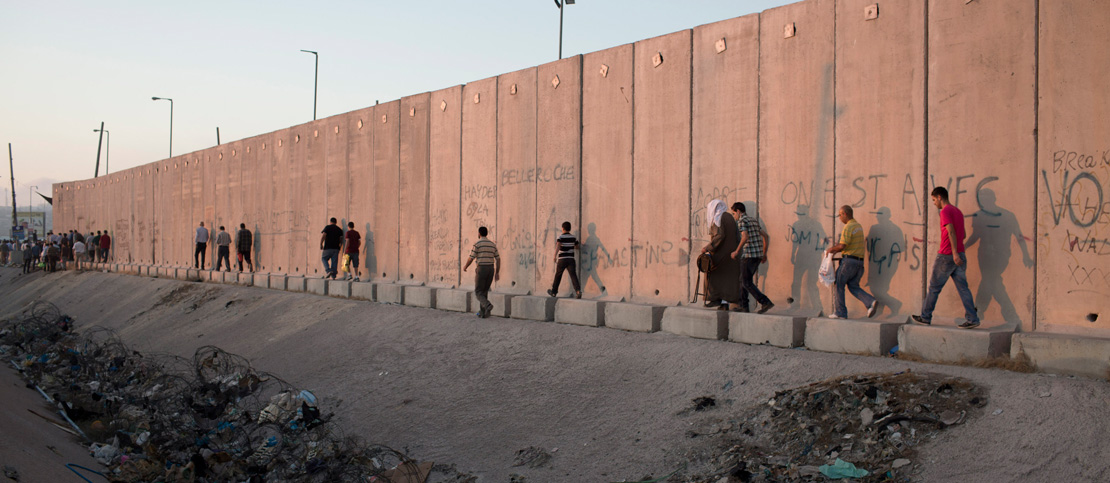It wasn’t the soaring arches or the elegant windows, with their curved caps. It wasn’t that the first room of the house was built in 1808. It wasn’t the jasmine that, like a woman letting down her hair, released its heavy perfume at night. It wasn’t the olive, loquat, lemon, almond, and apricot trees that filled the garden. Nor was it that the fruit from that garden seemed sweeter here in Bethlehem than it was in Jerusalem.
The apartment’s biggest selling point, in my landlady’s opinion?
The well.
She showed it to me the first time I saw the place, before I’d decided to rent the apartment. The well was hidden behind a curtain in the kitchen. She pushed the fabric back, revealing a deep recess in the wall. Inside the nook stood a pump and, on the floor, a large stone with a wrought iron handle. My landlady, who was in her seventies, gave the handle a tug. The rock lifted. There was a clunk as she placed it on the kitchen floor.
My landlady got on her knees and peered into the hole, a spot of night surrounded by chiseled white.
“See?” she tapped my calf, signaling that I should get on the floor, too. I obliged her.
I peered into the well. I didn’t see anything. But I could smell the collected rainwater below us.
My landlady put her hands on my back and pushed herself up. As she brushed the dirt off her knees, she explained to me that, if I were to take the apartment, we would share the well. And while our neighbors’ taps would run dry—as they always do here, eventually—we would never go without.
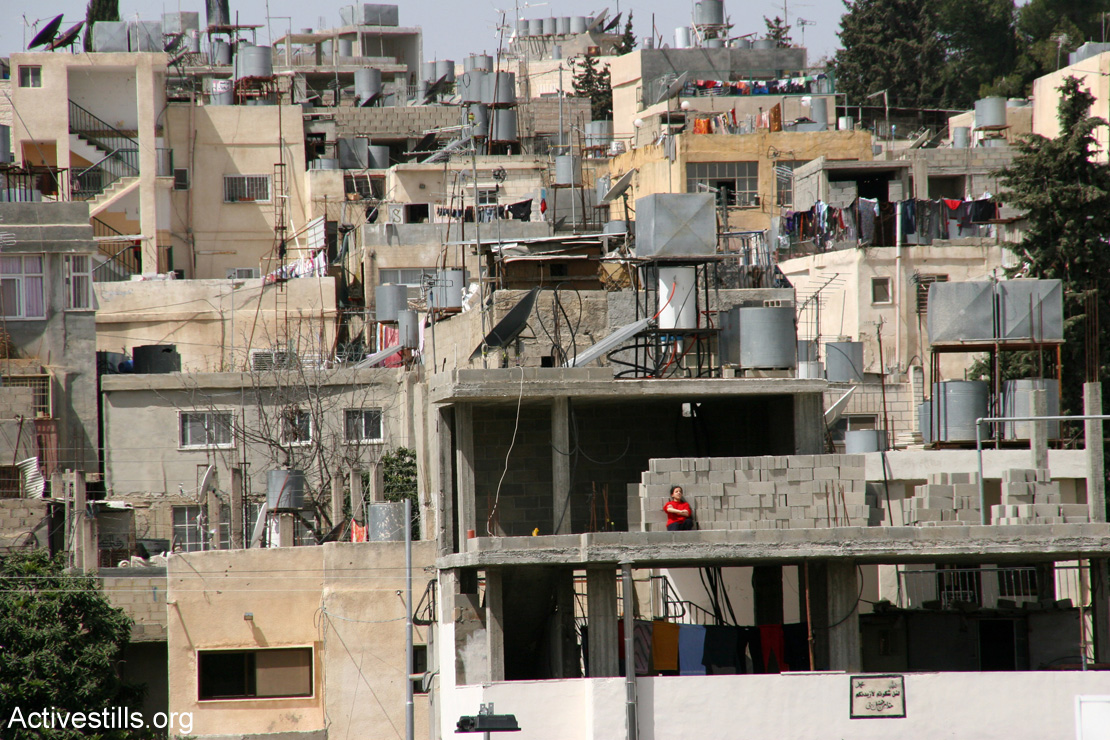
I remembered a long, waterless weekend I’d spent in Bethlehem in 2010. An American friend who lived and worked there had invited me to come celebrate his birthday. I was living in Tel Aviv then and had only been to Bethlehem once before, to work on an article for The National. The photographer who’d been assigned to the story also had Israeli citizenship. Unlike me, however, he had a car. That day, we’d left the Bethlehem area via the settler checkpoint outside the tunnels—a checkpoint we should have breezed through as two Jews riding in a yellow-plated vehicle. But the female soldier stopped us and asked for my ID. Nervous about the fact that I’d been in Bethlehem, which is off-limits to Jews who hold Israeli IDs, I gave the solider my American passport. She rifled through it looking for my visa. When she didn’t find it, she rolled her eyes at me, sighed, and asked me in Hebrew, “Where is your identity card?”
The photographer and I talked our way out of trouble. But I was rattled by the experience and feared that I’d be arrested the next time I was caught. Still, when my American friend asked me to come out to the West Bank for his birthday, I said yes. I told myself that I didn’t need to think too far ahead—I’d worry about leaving when it was time to leave.
When I got there, I found my friend’s house filthy; his kitchen sink overflowing with dirty dishes. “The water’s out,” he explained. He showed me how we could flush the toilet and brush our teeth using the water he’d saved in plastic bottles ahead of time. I would learn later that other friends keep buckets in their showers to collect the grey water. Because this is what you do in the West Bank, where you’re always waiting for the taps to go dry, where the Jewish settlements you can see from your window or that you pass on the road—the nice, neat, clean settlements that are locked away behind fences and surrounded by security—have green lawns and full swimming pools.
Despite the water shortage, what was supposed to be an overnight trip to Bethlehem turned into three nights of sleeping on my friend’s couch. Every time I thought about leaving, I remembered my confrontation with the female soldier. There are checkpoints on every side of Bethlehem: how could I get out of here without getting caught? And this time I was without a car: wouldn’t it be even more difficult on public transportation? Because I’d be coming out of a Palestinian area, I’d be on a Palestinian bus. And while settlers’ buses just roll through the checkpoints, Palestinian buses are always stopped, passengers IDs are always checked.
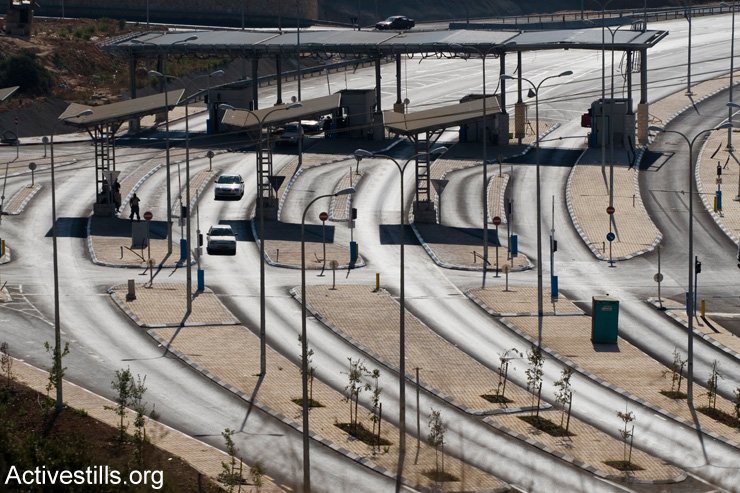
I couldn’t figure it out, and I dreaded the soldiers, so I just stayed. And stayed. I joked with my American friend that it would be easier for me to go to Jordan and take a flight from Amman to Tel Aviv than it would be to just take the bus home.
Finally, on the fourth day, I realized that I couldn’t just wait out the occupation. The checkpoints and soldiers weren’t going to disappear. And I needed to take a shower. I had to get back to Tel Aviv somehow.
When I left my friend’s apartment that day, I had no idea how I’d get home. Nor did I know that Bethlehem would soon be my home; that I’d end up moving here less than three years later, into a house—a house with a well—owned by refugees from Jaffa.
***
It happened in steps. First I left Tel Aviv and moved to Jerusalem. Comfortable enough in Hebrew, I started studying Arabic. I began writing less about migrant workers and African refugees—my old south Tel Aviv beat—and more about the occupation. I started teaching at a university in the West Bank.
The commute from my apartment in the West Jerusalem neighborhood of Kiryat Yovel was long, sometimes taking as much as two hours door to door. First I’d walk to the light rail. Then I would take the light rail to Damascus Gate, get down, and walk to the Palestinian bus station in East Jerusalem. The territories aren’t just under occupation, they’re also under separation—separation from each other, separation from the Jews. After waiting for the segregated bus to fill, I would ride it to Abu Dis.
I wept — out of shame for the things I said; because I meant them in the moment; because I didn’t mean them now.
To arrive on time for my 8 a.m. class, I had to wake up at five and leave the house around 5:30. I needed the half-hour cushion for delays, like when the light rail was stopped because somebody reported a suspicious package. It was during Israel’s 2012 pummeling of Gaza, “Operation Pillar of Defense.” With the light rail at a standstill and time racing ahead, I had no choice but to hail a taxi.
I got in and told the driver that I was going to Damascus Gate.
“Shaar Shkhem?” He repeated in Hebrew, sounding surprised.
“Yes.”
He glanced at me in the rearview mirror, giving me a weary look, sizing me up. I worried that he might refuse the ride. Once, on my way from Ben-Gurion Airport to Tel Aviv, a cab driver had threatened to dump me on the side of the highway when, in the course of our conversation, I mentioned that I wrote for Al Jazeera.
But the driver continued. As we neared the city center, however, he insisted on dropping me off there.
“No,” I pushed back. “I need to get to Damascus Gate.”
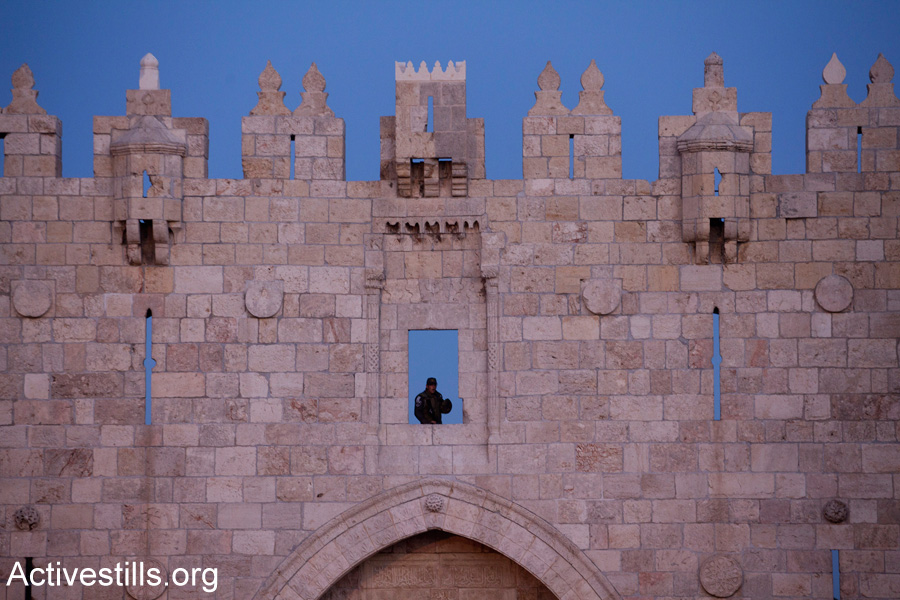
“But,” he began, “are you Jewish? Because, if you are, it’s not safe for you there. Especially not now.”
What, when we’re pummeling Gaza for no good reason? I thought. Instead, I just said, “It’s fine. I’m safe.”
The driver argued that I was putting myself at risk. He asked why I was getting out at Damascus Gate anyways.
I explained that I worked in the West Bank.
And thus began the political conversation I’d been trying to avoid. Because I knew where the discussion would go. Because it was early in the morning and I’d already read the bad news coming out of Gaza and because I’d dealt with the light rail stopping because of a suspicious package. Because I just wanted to get to work.
Things went exactly where I expected them to, with the cab driver telling me that Operation Pillar of Defense was necessary, that the Palestinians were getting what they deserved, that we needed to obliterate Gaza and re-occupy it.
A face flashed before my mind’s eye: one of my favorite students. Born and raised in a refugee camp near Hebron, she was hardworking, curious, sensitive, gentle, compassionate, and smart. Kind. Open-minded. Non-judgmental. In Arabic, she would be described as having a “white heart.” This student was in my Monday/Wednesday eight a.m. class and on those mornings, she was the reason I got out of bed at five. Knowing she would be there in Abu Dis, waiting for me, was what got me moving.
And the cab driver thought the Palestinians were getting what they deserved. Did my beloved student—did any of my students—deserve this?
I didn’t realize I was speaking until I heard my voice. I was shrieking at the driver, cursing him, ya ben zona, you son of a bitch, wishing death—“No, not just death. Death full of pain”—upon him and all of his family.
“You and all of your family!” I repeated as I hurled the cab fare at him and exploded out of the taxi. I turned my back to the street and faced the Old City so he wouldn’t be able to see my face as he rounded the traffic circle and headed back toward West Jerusalem.
I wept.
Out of shame for the horrible things I’d said to him; because I’d meant them in the moment; because I didn’t mean them now, because I wanted to take them back; because I knew my favorite student would never wish death on anyone, because she would be disappointed in me, because she would no longer look up to me. Because I was disappointed in myself, because I was disappointed in the cab driver, a fellow Jew, because I was disappointed in the Jewish state.
I cried for the driver and the hatred he lugged around, for the life he was trapped in. Because he was brainwashed by the state that kept him poor, by the government that pitted him against Palestinian workers and stoked the flames of racism.
I cried for Gaza.
And then, with my 8 a.m. class drawing ever closer and my student waiting for me there in Abu Dis—her face round and innocent and full of expectations and hope, even in the middle of a war, even though her brother, in a matter of months, would be detained by the same army that had already arrested so many of her uncles and cousins—I pulled myself together and continued on my way.
On my way to the Palestinian bus station, I stopped to buy a tea from a street vendor. He saw my puffy eyes and noticed me wiping my nose with the back of my hand like a child. “What happened?” he asked me in Arabic. I told him that I was upset about what Israel was doing to Gaza.
“Don’t worry,” he said. “Hezbollah will join the war soon, inshallah.”
I would have burst into tears again if I’d had any left.
***
There was another reason I headed out from my apartment in Kiryat Yovel at 5:30 a.m.: I needed the half-hour cushion because the Palestinian buses don’t run according to a schedule; they only leave the station when they are full. Another reminder of Israeli privilege. You can count on Jewish buses, the green Egged buses, which are subsidized by the state. In general, you can plan around the Egged buses, you can arrive on time. These little things end up making an impact on bigger things, like morale and productivity and the economy.
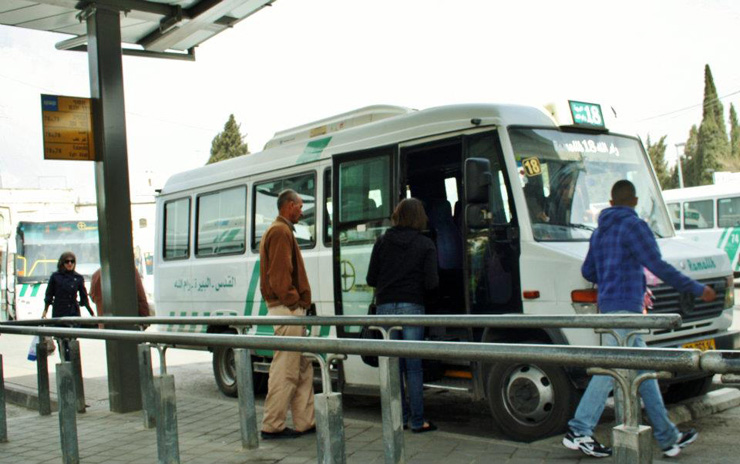
But it wasn’t just the five a.m. wake-up and the two hour commute that wore me out. It was also what happened during the trip. Leaving East Jerusalem, the bus would roll through the checkpoint like all the other cars entering the West Bank. Coming back in to the city, however, the Palestinian buses were singled out and pulled over. The Egged buses full of Jewish Israelis headed to and from settlements—which are illegal according to international law—were free to pass.
(Stop and think about this for a second: the settlers, the people whose presence is illegal in the territories, are free to leave the West Bank and enter Jerusalem as they wish while the Palestinians are treated like criminals. Under occupation, everything is hafuch al hafuch al hafuch—the reverse of the inverse of the reverse. Down is up and up is down and down is up. And as you struggle to make sense of it all—as you try to figure out which way is indeed up and which is down and if it even matters anymore—everything starts to seem senseless all over again.)
Coming from Abu Dis, a Palestinian area, meant that I was on a Palestinian bus. As other cars and Egged buses drove through the checkpoint, our bus would ease over to the side and slow to a stop. The driver would open the door. Everyone would get off and file into a walkway lined with chicken wire—what can only be described as a cattle chute. A soldier would stand at the front, between us and the now-empty bus. One by one, we would present him with our IDs so we could get back on the bus and continue to Jerusalem.
Because it was going directly to and from the university, almost all of the passengers on my bus were students, professors, or other administrative staff. Almost all were East Jerusalemites, meaning that they held an Israeli ID card that, from more than a foot away, looked nearly identical to mine. So, most of the time, nothing looked amiss to the soldiers. They see what they want to see—or what they expect to see. And because I’d gotten off a Palestinian bus and was surrounded by Palestinians and because I was holding up a blue ID, just like everyone else, and maybe because I look ambiguously ethnic, they waved me through, assuming that I, too, was Palestinian.
But every once in a while, the difference in my ID would catch a soldier’s eye. The reaction was the same every time. First, a double take. Second, they’d take my ID out of my hand. Next: a long look at the ID, a glance at me, back to the ID.
And then the question, sometimes whispered, sometimes barked. Sometimes asked in awe, sometimes anger.
Mah at osah po? What are you doing here?
I work at the university in Abu Dis, I’d answer in Hebrew.
The awe or anger invariably gave way to disbelief as they asked: Mah at osah sham? What do you do there?
I teach there.
Sometimes that was it and I was free to get back on the bus. Sometimes the soldier would call a second soldier and they’d puzzle over my ID together and ask me more questions, questions designed to ask without asking. Where do you live? Which neighborhood? How long have you lived there? Where did you live before that?
But sometimes they would just ask: are you Jewish?
On more than one occasion, I had to explain to the soldier that, yes, it’s legal for me to be in Abu Dis and it’s legal for me to be on this bus. Irritated, I also pointed out the irony that I, a civilian, was explaining the laws to him, the soldier. If anyone should know the laws here, it’s him, not me, right?
Another time, a concerned girl soldier took me aside to ask me if everything was okay, if I was safe, had I been hurt?
On more than one occasion, I had to explain to the soldier that, yes, it’s legal for me to be on this bus.
Once, a soldier didn’t believe that I was, indeed, the person in the ID. He thought I was using someone else’s to try to sneak into Jerusalem and he asked me to produce another form of identification with a picture. I had not yet bothered to get an Israeli driver’s license—I didn’t have a car—so I gave him my old Florida driver’s license. He was skeptical about that ID, too: At b’emet mi’Florida? You’re really from Florida? Asked as though I don’t speak Hebrew with a heavy American accent.
I started to panic. A Kafkaesque scenario flashed before my eyes—what if I can never prove to him that I’m me? What if he locks me up and no one believes that I’m me? And I’m arbitrarily detained forever?
I realized, of course, that my fears were absurd. But the occupation is an absurdity. Hafuch al hafuch al hafuch.
As was the soldiers’ inability to wrap their heads around my presence at the checkpoint. Was it that hard for them to believe that a Jew worked at a Palestinian university? That a Jew could ride a Palestinian bus? And that I could do all these things without being harmed?
Every trip through the checkpoint—whether I was waved through or whether I had trouble with the soldiers—was distressing. I was upset, of course, at the checkpoint’s mere presence and all that it implied for Palestinians’ human rights and freedom of movement (or, rather, the lack thereof). The checkpoint was a reminder of segregation, of people’s inability to reach their friends, family, work, schools, and medical care.
And then there was my reaction to the soldiers who manned the checkpoint. I would see a Star of David dangling from a soldier’s neck and remember the chai necklace that my mother made me wear when I was a child. The thought would pop into my head: these are my people.
No. I would push back. These are not my people.
Who are my people?
***
After a semester of commuting, I was exhausted, so I took a room in Abu Dis. I’d spend the weekdays there and head back to Jerusalem for the weekend. I thought this would simplify my life. I quickly found out that it would just make things more complicated.
I realized this one bright spring morning, after I’d lived in Abu Dis for a few months. I’d just finished teaching my eight a.m. class and was headed to the hummus joint 100 meters or so from the university when a line of Israeli army jeeps came roaring up the street. They looked absurdly out of place: the ugly military green clashed with the stone buildings rendered warm and mellow by the rising sun. Their boxy shape was an affront to the rolling hills and soft edges of the olive trees that shimmered silver in the wind; their uniformity strange before the patchwork of stores and restaurants and houses, before the colorful blankets and rugs that housewives hung from their balconies. Even the jeeps’ sound didn’t fit the place, the engines drowning out the village’s morning murmurings of sabah al-kheir and sabah al-noor and Fairuz’s songs drifting from an open window and the birds’ gossipy chatter.
Entering Abu Dis, which lies beyond the wall, is a provocation in and of itself. It’s a reminder that the occupier is always near. And when he isn’t near, he’s inside: inside your village, raiding your house, demolishing your home, arresting your children, shooting unarmed civilians to death, confiscating your land for settlements, manning the checkpoints that rob you of your time and dignity. But first, before the occupier gets out of the jeep and does any of that, he drives.
The separation barrier isn’t just about keeping ‘them,’ the Palestinians, out. It’s also to keep ‘us,’ the Jews, ‘in.’
He drives up the street, the street I walk down every day. The one that leads to the produce shop where I buy my fruit and vegetables and the stand that sells olives from the neighboring village, the market where I buy fresh shrak and labaneh and eggs and meat. The street that takes me to another road that takes me home, to the place where I cook and eat and laugh, where I sleep at night, where I wake in the morning to hear birds chirping outside my window. My friend and her husband and her three kids don’t live off this street but they live in that house over there, that house where in the winter, during the rain, I leave my wet boots by the door and she gives me a pair of nice, clean socks and after lunch I help her with the dishes as though I’m not a guest but part of her family, and I speak broken Arabic with her three children. The house where—when I’ve already been there for four hours and I need to get home—my friend says badri, badri, telling me it’s too early for me to go. Stay, stay. Haliki, haliki, ya Mya.
This is the street where, when I walk alone, colleagues and acquaintances stop to offer me a ride home. They know that I’m Jewish; they know that I have an Israeli ID. One sees a parallel to his own life—he’s really PFLP, he confides in me, but pretends to be Fatah so he can keep his job at the university. This is the street where we keep each other’s secrets. This is the street that keeps me safe.
And with the jeeps headed straight toward us, the street moved as one. The boys around me picked up rocks. I didn’t think, my body mimicked those around me.
I bent over and reached for a stone.
Wait, wait! a voice inside of me said in Hebrew. I saw them in my mind’s eye: the baby-faced boys in the jeeps, child-soldiers who had started learning about the Holocaust in preschool, who believed that Palestinians pose a mortal threat, human beings who had been brainwashed and believed that they were doing something good for am hayehudi, the Jewish people.
My people.
No, no, I argued with myself. These are not my people.
The spell was broken. I was no longer moving with the street. Feeling something heavy in my hand, I looked down and was shocked to see that I was holding a rock. I dropped it just as the boys around me began to pelt the jeeps with stones and the soldiers began to fire tear gas.
The jeeps stopped and the soldiers got out, guns in hand. I heard a pop I recognized from protests—rubber-coated bullets. Caught between rocks and guns, I ducked and looked for a way out of the mess. A store owner who’d come outside to close his steel shutters waved at me. He pointed at a line of parked cars and then himself. I understood. I should get behind the cars, run alongside them and then into the store.
I did and I was safe. But the moment I bent over and picked up a stone was something that I would return to over and over in my head—how I’d lost myself in my surroundings, how confused I’d felt when I thought of the soldiers, how I felt at once connected to them and the village. How mortified I’d felt when I looked down and found a rock in my hand.
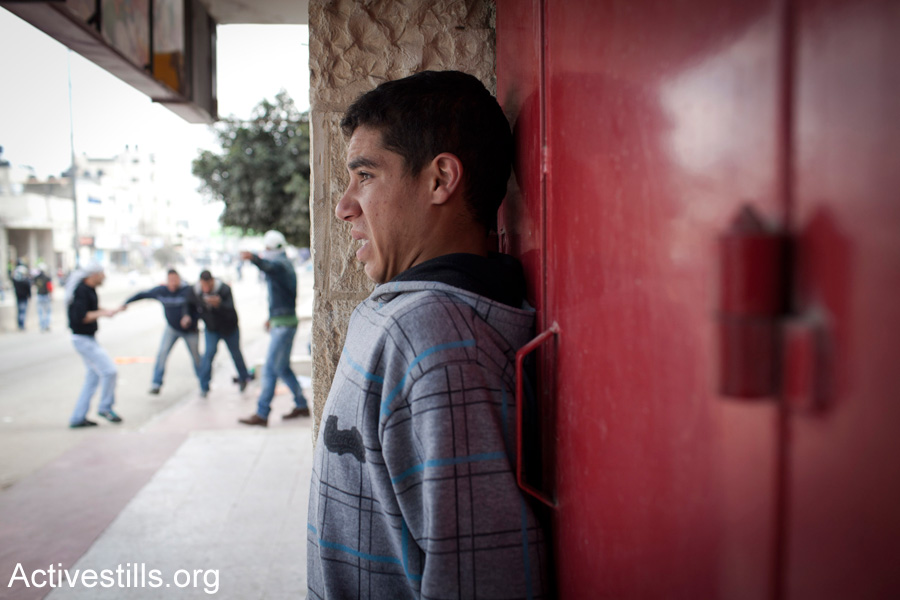
***
Finding it increasingly difficult to relate to Jewish Israelis, even those who weren’t in uniform, I began dating a Palestinian journalist I’d met in Ramallah. He was a West Banker with a green ID. This meant that he wasn’t supposed to visit me in Jerusalem—where I spent most of my weekends—without an Israeli army issued permit.
But he came anyway. There are a number of places where the separation barrier isn’t finished, where there are gaps in the chain-link and barbed wire fence. One is within sight of a checkpoint; my partner arrived to that particular hole in one afternoon, on his way to Jerusalem to see me, only to find soldiers on the other side. They’d closed the fence and were admonishing the crowd of Palestinians that had gathered and were waiting to cross, tut-tutting them, warning that they’d better not even try it.
“Then the soldiers got in their jeep and drove away and one of the men took out some wire cutters,” my partner laughed as he recounted the story, using the air and his fingers to show me how the fellow had cut the fence and held it open.
The hole, my partner explained, leads to the checkpoint.
“Huh?”
“The parking lot,” he clarified. “I caught the Jerusalem bus from there. First they take the people who have come through the checkpoint with permits. Then they pick us up.”
“No way. Really?” I asked him, in Hebrew.
He answered in Hebrew in kind, ken, yes, and showed me the pictures he’d taken on his phone. There was the guard tower, just meters away. There was the group that had gathered as soldiers attempted to enforce the new closure in the fence; there was the fellow holding the hole open; there were men helping an elderly woman and a young lady through. The parking lot; the bus. I was struck again by the absurdity of it all. Hafuch al hafuch al hafuch.
That’s not to downplay Israeli-imposed restrictions on Palestinian freedom of movement. It’s more to point out that if someone wants to slip into Israel without a permit, they can. In fact, approximately thirty thousand Palestinian workers do it every day. But, in doing so, they risk injury, arrest, and death. In July of 2012, a Palestinian day laborer was killed when soldiers opened fire on a car full of workers that tried to pass a checkpoint without permits.
Despite the danger, we managed to see a lot of each other. But it’s impossible to have a proper relationship—to unite, to become one—when there’s a wall dividing you, making certain that you remain two. Which is, of course, the point. The separation barrier isn’t just about keeping “them,” the Palestinians, out. It’s also to keep “us,” the Jews, “in.”
Moving to the West Bank started to make sense. Though I could be arrested if I was caught in the “wrong” area—that is, Area A, the pockets of the West Bank that Oslo largely put under Palestinian rule—the consequences were far less severe for me than they were for my partner. We thought it very unlikely that a Palestinian would hurt me; conversely, inside of Israel, Palestinians have been attacked in public places on numerous occasions.
The center of my life had—slowly, unintentionally—shifted to the area beyond the wall, to a place I called “outside.” It was natural that my body would follow.
***
In May of 2013, I made a trial move to Bethlehem, staying in a friend’s apartment while she was in Gaza researching a book. Still without a car, I left the city only once that month. Bethlehem is hemmed in by checkpoints—every road out leads, eventually, to a checkpoint, two of which are off-limits to me as a Jewish citizen of Israel.
There’s the one known as “300”—the massive complex of cement and spikes and barbed-wire and turnstiles and booths and bullet-proof glass and guns and bullet-proof vests and the child-soldiers who wear them—that stands between Bethlehem and its big sister, Jerusalem. Leaving Jerusalem and entering Bethlehem via 300 isn’t difficult for people like me: Jewish citizens of Israel who hold a second passport. If you’re driving through, you flash a smile and the outside of your foreign passport to the guard in the booth, who presses the button that lifts the arm ahead. And that’s it, despite the two signs outside of the checkpoint warning that it is illegal for Israelis to enter Area A and that doing so puts their lives in danger.
On foot, the soldiers don’t even look at you as you enter Bethlehem via 300—yet another reminder that the army isn’t there to protect the occupied, as it is obligated to do according to international law.
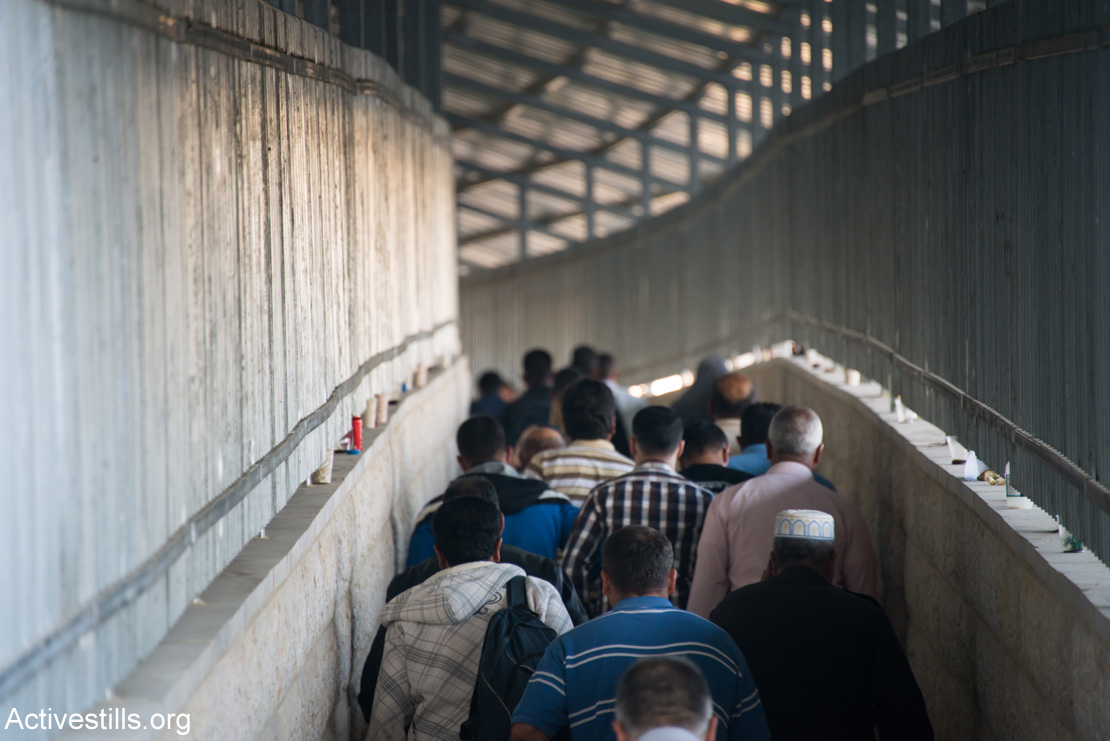
But turn around and try to enter Jerusalem—which the state considers “the eternal capital of the Jewish people”—and you’ll fast remember why the Israeli military is there. Those who are driving in have to pop the trunk of their car so that the soldiers can inspect whatever is inside. Those who pass on foot are subject to metal detectors and humiliating searches. A friend once saw soldiers ask an elderly woman to remove her shirt.
And, coming in to Jerusalem via 300, every ID is scrutinized.
I can’t chance it. I’m too likely to be arrested. So, via public transportation, there is only one other way to get in to Jerusalem: the Beit Jala bus. As the name suggests, the bus exits the Bethlehem area via Beit Jala, a Bethlehem suburb where, technically, Israelis are allowed to be. It then passes through Area C, using the same road that leads to the Har Homa settlement. When the bus arrives to the checkpoint outside of the tunnels that lead to Jerusalem, it’s pulled to the side. Meanwhile, the settlers roll on through.
And then it’s the same routine I knew from my Jerusalem-Abu Dis commute: everyone gets off, stands in line, presents their ID to a soldier, and then gets back on the bus that continues to Jerusalem.
While, technically, I was allowed to be at that checkpoint, being on the Beit Jala bus could arouse some suspicion because the line begins in Area A. But because Palestinian buses will stop to pick up people on the side of the road—a bit like taxis—I could have, in theory, boarded in Areas C or B. I’d memorized the names of restaurants and businesses that were on the strip of the road that was in Area C so, if need be, I could say I’d been somewhere legit. But I hate lying. And I’m such a terrible liar that I was once detained at the Qalandia checkpoint for answering the question “where are you coming from?” honestly: Ramallah.
The easiest way out of Bethlehem, for a Jewish citizen of Israel, was via a yellow-plate (Israeli) car. But because I was carless in May of 2013, I only left Bethlehem once. I didn’t move for the rest of the month. And it was fine. So fine that I ended up subleasing another apartment in Bethlehem in August. And that was fine, too. So I looked for something a little more permanent—a search that would lead me to the house with the well.

